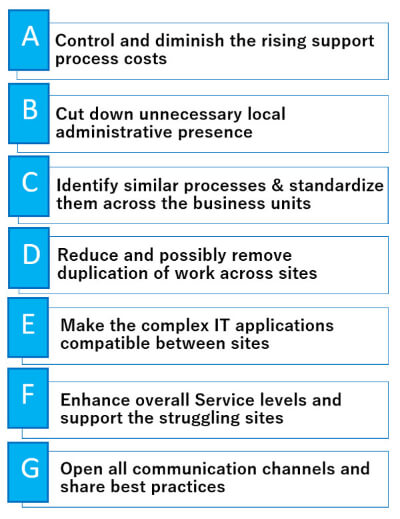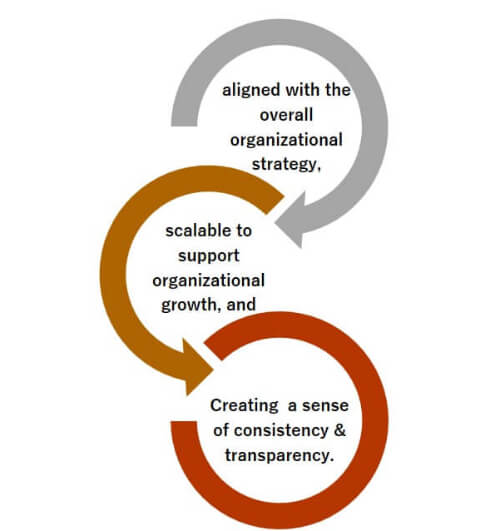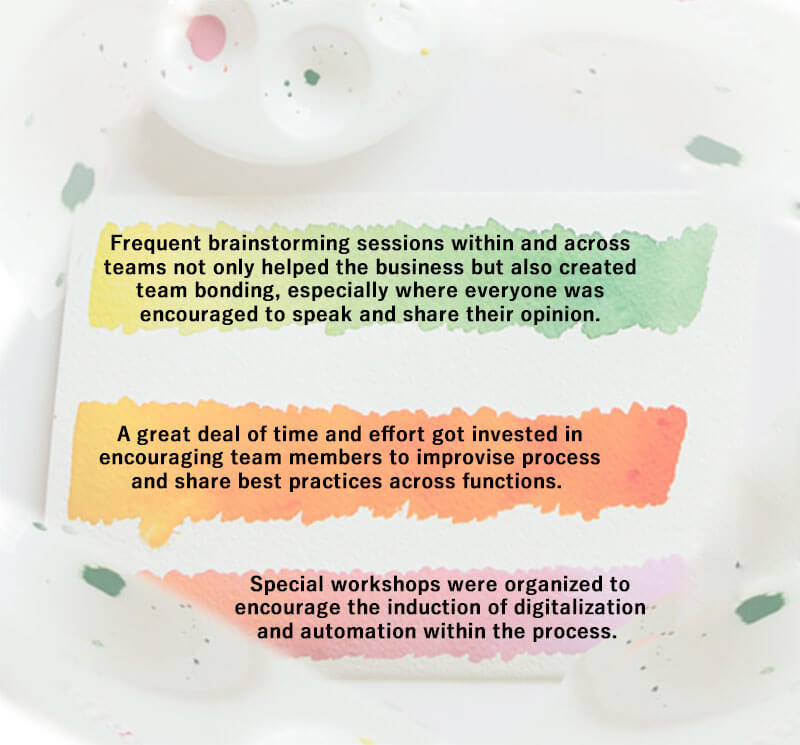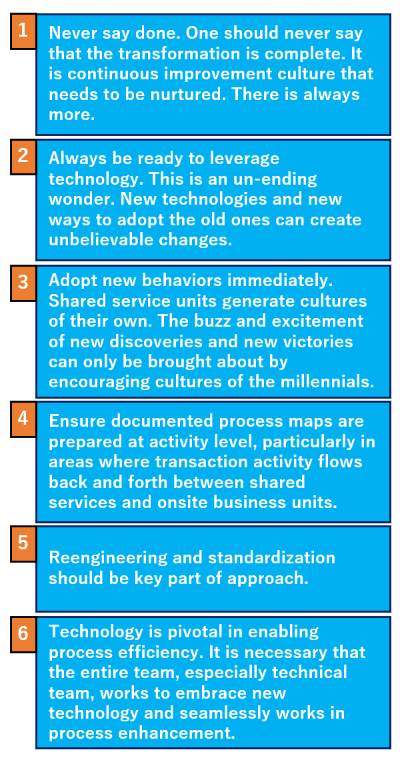
Would you like to start a conversation with other industry leaders to brainstorm a challenge or to just know more on a particular topic?
Engage in online discussions with your Peers
Start NowOrganizations have been implementing shared services since the mid-1990s. However, it often seems that wherever one is on the maturity curve, one still has a lot of journey to travel to achieve excellence in service. The thresholds of excellence simply keep advancing.
Identifying the Need
Service deliveries determine the health and wellbeing of the company in the long run. Many a times it cannot be directly measured in monetary terms. If the business service unit becomes complacent and does not create value for the organization, it is likely to have a direct impact on business itself. Competitors may begin to find ways to fill those needs. Therefore, there is a constant need for adding or increasing excellence in services for the continued success of a company and business in general.
YNI GSS is a business transaction support organization offering a wide range of services, largely focusing on commodity supply chain, oil & gas, and manufacturing industries. At present it is the shared service partner of GP Global, which is the erstwhile Gulf Petrochem Group based in the UAE. YNI GSS provides back and mid office processes support to GP Global.
The expertise of YNI GSS lies in offering comprehensive business transactional support, through unified processes, coupled with an agile and scalable model, delivering 24x7 support across the globe.
It all started around two years back, when the leadership and management of GP Global began to conceptualize a shared services unit for their back-office processes. The diversified business units seemed to be working in silos, there was too much duplication of processes across the business, the processes were non-standard, and the costs were unreasonably high. A professionally managed shared service unit, which could help consolidate and standardize the complex processes, was created, called YNI Global Shared Service (YNI GSS).
The Vision and Mission
A clear vision was defined for the GSS so as to keep the leadership focused. The unit was tasked to specifically:

The GSS team was given the responsibility and authority to transform the service delivery model. The newly designed model was to be:

Handling Adversity
It was clearly a demanding ask in terms of attention, resources and time. It involved a number of company wide issues such as different taxation, legal and administrative systems across the various sites. Legal and regulatory impact was assessed, and technical requirements were defined upfront. Accordingly, process designs were created. Also, specialist and professional resources were hired, who had good knowledge of international taxation, legal and regulatory laws.
Another huge challenge was employees’ resistance to move the processes and the SMEs to the GSS unit. While the shared service unit was being conceptualized, rumor mills were working overtime. The people in the organization were naturally curious and wanted to know the plans, especially since it affected them. A direct approach was preferred, and a communication plan was prepared accordingly. The leadership reached out to all employees who were directly or indirectly impacted by the creation of the GSS and explained the company’s vision and their roles in GSS. The importance of developing a robust business case that fulfills all the objectives of setting up the GSS was well understood upfront.
Several rounds of discussions were held with all stakeholders, their expectations understood, a detailed roadmap created, and finally a positive business case presented.
GP Global is an integrated commodity and services provider across various specialist products in the commodity sector. The shared service unit that was tasked to create the unified process hub was not like any other BPO or shared services – there is a huge need of adequate business and industry knowledge. The teams are required to support oil & gas and shipping businesses covering Europe, Middle East and some other parts of world. All processes across all sites had so many individual unique terminologies, usages, processes, and outcomes that the new resources had to undergo special induction programs just to understand the basic nuances. New joiners were made to go through extensive process and impact training too to ensure not only accuracy in transactions, but also understand the value or criticality of each and every transaction. Apart from this, there were several other challenges ahead. The GSS had to start running its operations within 3 to 4 months’ time of the confirmation of the list of functions were to be handled by GSS. With the help of a consulting firm, the GSS leadership team held a series of visioning workshops with the stakeholders and process heads. This gave an opportunity to understand the broader context felt easier to resolve and work on agreed guidelines.
The Process of Transition
A detailed roadmap was created for GSS to set timelines and provide re-assessment milestones. The roadmap also covered documentation of responsibilities, key activities, and deliverables. Detailed SOPs and process implementation plan were created. A thorough threat assessment was done, and gaps fixed as identified by the threat assessment.
A key principle of “Standardization by Reengineering and Digitalization” was agreed to and followed to the letter all through the stages of process migration and service delivery.
In parallel, a keen focus was kept on service quality to help the business units fulfill their business mission, while their processes were being under transformed.
Opportunities to redesign and redefine the processes were abundant. Some only required a tactical approach, such as clearly defined detailed SOPs, check lists and risk assessment sheets. Some were more complex, requiring accurate and comparable benchmarking systems. Requisite expertise was brought in, whenever required, to arrive at the most efficient process structure.
A program was created wherein every process had a specialist who carried out transactions for the assigned process, agreed to with the business units. The specialist was accountable for ensuring that all transactions associated with that process are carried out in a timely and efficient manner and are delivered to or have exceed the performance standards as set out in the KPIs.
The GSS mantra to celebrate team successes, not just individuals has stood by very well. The culture thus developed speaks volumes about teamwork.


Process Stabilization and Beyond
As the processes went live, deviation identification and impact assessment work began. Actions to resolve deviations were quickly put in place to mitigate any damaging consequences. All key activities were done with complete engagement of the stakeholders. Regular updates became routine and proper channels of communication were opened and actively used. A robust, joint project plan was developed at the outset and followed rigorously.
The next stage was to develop a business continuity plan. This process too began as soon as the business processes went live and streamlined. A unit wide strategy and process wide plan was created with the collaboration of the process owners. An effective business continuity strategy minimizes loss to the business by establishing and formalizing its preparation. A business continuity plan is all the more necessary for a shared service unit given that many processes are run from them and business units depend heavily on them. Typically our plans included business and technical objectives, roles and responsibilities, tools and templates, disaster recovery timelines and acceptable thresholds.
The last almost two years has been a whirlwind journey of Migration – Reengineering – Automation – Stabilization. Most of the objectives have been achieved: cost reduction, consolidation, standardization, transparency in functions, and above all, the outcomes have become more process oriented rather than people oriented.
Individual dependency is not a key factor anymore. Clearly, there is still a long way to go; it is a continuous journey to rediscover and find new opportunity areas.
A Mid-course Look-back
The few key learnings for the new and future leaders of a shared service journey could well be:

Future Strategy for YNI Global
YNI Global has the advantage of being amongst the few professional service organizations in the niche O&G, supply chain and trading sector. The near-term plan should clearly be to build on the core competencies. The target is to continue to focus on the Oil & Energy sector to specialize and not compete in the general shared services market – and to offer our customers the best in class services.
ABOUT THE AUTHOR

Niranjan is the Global Head of IT & CEO of YNI Global Services LLP. He has led the development & implementation of the GSS. He brings in more than 3 decades of experience and has been associated with the group for the last 4 years. His core areas of expertise include system development & implementation, group governance and strategy development.




